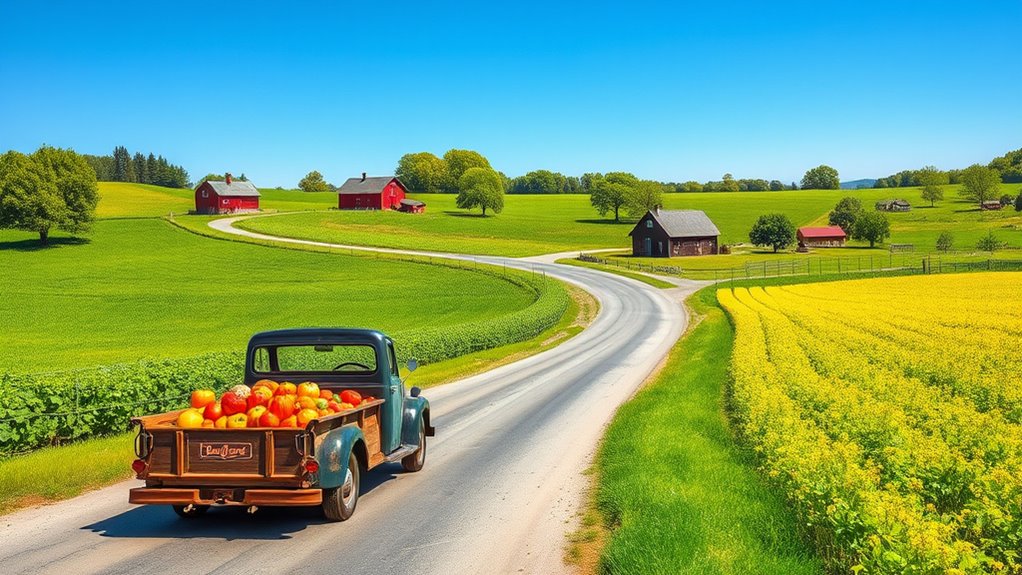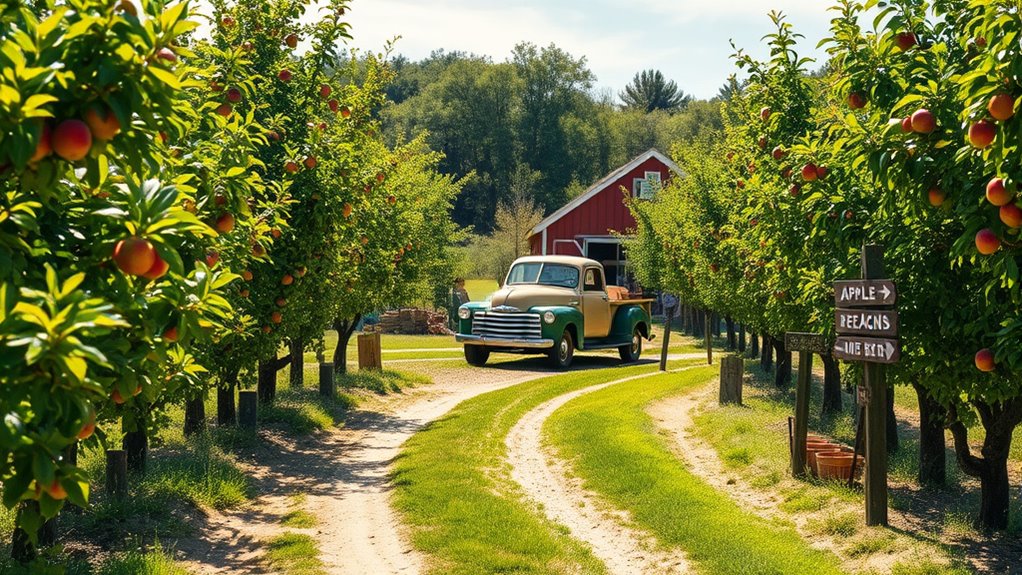A farm-to-table road trip lets you visit organic farms and orchards across the country, experiencing fresh produce directly from the source. You’ll supported sustainable agriculture, learned about eco-friendly farming practices, and connected with local farmers. These trips not only offer delicious food but also deepen your understanding of seasonality, crop planning, and sustainable living. Keep exploring, and you’ll discover how your journey can make a meaningful impact on farms and communities alike.
Key Takeaways
- Explore diverse organic farms and orchards nationwide to experience local agriculture and fresh, seasonal produce firsthand.
- Support sustainable farming practices and local economies by purchasing directly from farmers.
- Participate in educational farm tours, tastings, and workshops to learn about eco-friendly techniques and food origins.
- Discover how farm-to-table trips promote environmental stewardship and community health through conscious travel.
- Transform scenic drives into meaningful journeys that boost local food movements and foster sustainable agriculture awareness.

Starting on a farm-to-table road trip offers a unique chance to experience local agriculture firsthand and enjoy fresh, flavorful produce. As you travel from farm to farm, you become part of a broader movement that values sustainable farming practices and supports local food movements. These initiatives focus on reducing environmental impact, conserving resources, and fostering community connections. By visiting organic farms and orchards, you gain insight into how food is grown with care for the land, animals, and future generations. You’ll see firsthand how farmers implement eco-friendly techniques such as crop rotation, composting, and integrated pest management to maintain soil health and reduce chemical use. Understanding these methods helps you appreciate the importance of sustainable agriculture and how it impacts the quality of the food you eat.
As you stop at local farms, you’ll notice how committed these growers are to creating a transparent food system. Many of them participate in local food movements, which emphasize direct relationships between farmers and consumers. These movements aim to cut out middlemen, ensuring that you receive produce at its peak freshness while farmers earn fair compensation. When you purchase directly from farmers’ markets or farm stands, you’re supporting these efforts and promoting a resilient local economy. It’s satisfying to see how your choices can make a difference—helping small-scale farmers thrive and encouraging more sustainable practices across the industry.
During your visits, you’ll also learn about the seasonal nature of the produce and how farmers plan their planting schedules to maximize crop yield without overexploiting the land. Many organic farms host farm tours, workshops, or tastings, giving you a deeper understanding of the journey from seed to plate. This hands-on experience enhances your appreciation for the labor and dedication that goes into growing healthy, sustainable food. Plus, it’s an excellent way to pick up cooking tips and recipes that highlight the fresh flavors you’ve just experienced.
Traveling along this route, you’ll see that supporting local farms isn’t just about buying fresh produce—it’s about participating in a movement that fosters environmental stewardship and community health. Your choices influence the demand for sustainable farming practices, encouraging more farmers to adopt eco-friendly methods. The more you seek out local, organic options, the more you contribute to a food system that values quality, transparency, and sustainability. In this way, your farm-to-table road trip becomes more than just a scenic drive; it becomes an active step towards building a healthier, more sustainable future for everyone.
Frequently Asked Questions
What Are the Best Times of Year to Visit Organic Farms Nationwide?
You should visit organic farms during their seasonal harvests, which vary by region and crop. Typically, late spring and summer are peak visiting times when fruits and vegetables are abundant. Fall is also great for apple and pumpkin orchards. Planning your trip around these peak visiting times allows you to enjoy fresh produce, participate in harvest festivals, and see the farms at their most vibrant and productive.
How Can Travelers Support Local Organic Farmers Responsibly?
To support local organic farmers responsibly, you can join CSA programs, which provide direct support and fresh produce. Always follow farm stand etiquette by respecting signs, asking permission before photographing, and being courteous to staff. Purchasing seasonal products helps farmers sustain their operations, and spreading awareness encourages others to support sustainable agriculture. Your mindful choices make a positive impact on local farms and promote healthier, eco-friendly food systems.
Are Farm Tours Suitable for Children and Families?
Farm tours are fantastic family-friendly activities that can turn an ordinary day into an unforgettable adventure. Kids get to explore nature firsthand and learn about where their food comes from. Just remember to follow farm safety tips, like staying with the group and avoiding restricted areas. With proper guidance, farm tours are perfectly suitable for children and create lasting memories, making them an enriching experience for the whole family.
What Are Common Organic Farming Practices Travelers Should Observe?
When visiting organic farms, you should observe practices like caring for soil health through composting and crop rotation. Watch for natural pest management techniques, such as beneficial insects or organic sprays, instead of chemical pesticides. Pay attention to how farmers maintain biodiversity and avoid synthetic inputs. These practices help sustain the land and produce healthy food, giving you a better understanding of organic farming’s commitment to environmental responsibility.
How Do Organic Farms Ensure Sustainability and Environmental Health?
Organic farms guarantee sustainability and environmental health by practicing soil conservation techniques that protect land and promote healthy growth. They also use natural pest management strategies, avoiding synthetic chemicals that harm ecosystems. By maintaining healthy soils and managing pests responsibly, you help support biodiversity and reduce pollution. These practices make farms more resilient, ensuring fresh, organic food while safeguarding the environment for future generations.
Conclusion
As you journey through these lush farms and vibrant orchards, think of yourself as a brave explorer steering through a rich, living map. Each farm is a hidden treasure chest of flavor, waiting to be discovered. Your taste buds are the compass, guiding you toward freshness and authenticity. Embrace this adventure, for every bite connects you to nature’s true bounty—making you a part of the ongoing story of nourishment and tradition.










